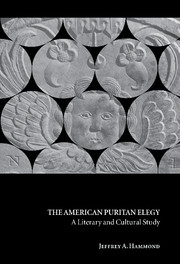Book contents
- Frontmatter
- Contents
- Preface
- Acknowledgments
- Introduction
- Chapter 1 Monuments enduring and otherwise
- Chapter 2 Toward an anthropology of Puritan reading
- Chapter 3 Weep for yourselves: the Puritan theology of mourning
- Chapter 4 This potent fence: the holy sin of grief
- Chapter 5 Lord, is it I?: Christic saints and apostolic mourners
- Chapter 6 Diffusing all by pattern: the reading of saintly lives
- Epilogue: Aestheticizing loss
- Notes
- Works cited
- Index
Chapter 2 - Toward an anthropology of Puritan reading
Published online by Cambridge University Press: 22 September 2009
- Frontmatter
- Contents
- Preface
- Acknowledgments
- Introduction
- Chapter 1 Monuments enduring and otherwise
- Chapter 2 Toward an anthropology of Puritan reading
- Chapter 3 Weep for yourselves: the Puritan theology of mourning
- Chapter 4 This potent fence: the holy sin of grief
- Chapter 5 Lord, is it I?: Christic saints and apostolic mourners
- Chapter 6 Diffusing all by pattern: the reading of saintly lives
- Epilogue: Aestheticizing loss
- Notes
- Works cited
- Index
Summary
As Taylor read his tribute, David Dewey's mourners periodically nodded their heads in agreement, some dabbing their eyes with handkerchiefs or mourning gloves. The older people stared at the coffin with blank expressions and tightly pressed lips. Sarah Dewey, listening closely as Taylor recounted her husband's life, found herself nodding in agreement at the minister's proclamation that “Grace's Dew” in David had
…drencht thy Consort's heart
In influences of an holy Art:
Whom, with thy little Stems which thou dist leave
Thou dists, ere thou departst, to Christ bequeath.
(“Edward Taylor's Elegy” 82–83)While Taylor was counting the ways in which David's life had been illuminated by the Spirit, Sarah Dewey felt the words giving a shape to things, settling her thoughts into patterns she had known since she was a little girl. In her sadness and shock, it was a blessing to remember how God's people lived and died. She hoped that when her time came she would be worthy of the same embalming – that the Lord would distill her into the essence of holiness that Taylor was lining out under the formless haze of the late afternoon sky. She knew she would remarry, as most everyone did: if people gave up living because of sorrow, life would cease altogether. She would go on, though just now she could not imagine herself being with another man. How could she ignore David's face in the boys' faces, or their awkward aping of his walk?
- Type
- Chapter
- Information
- The American Puritan ElegyA Literary and Cultural Study, pp. 42 - 68Publisher: Cambridge University PressPrint publication year: 2000
- 1
- Cited by



